TOGETHER
The uniting TOwards Gender Equality for enjoyment of women’s and girls’ Total HEalth and Rights Project – TOGETHER
Date: 17 September 2021 to 31 August 2027
Area: Preah Vihear, (CheySaen, Chhaeb, Choam Khsant, Kuleaen,Rovieng, and other districts) and Steung Treng (Siem Bok, ThalaBarivat, Sesan, Siem Pang, and other districts), and Kompong Thom Provinces (Sandan district)
Primary Project Beneficiaries: 43,451
Budget: Total 4,612,593 USD
Donors: Global Affairs Canada and ADRA Canada
ADRA Canada, its Canadian partners(Salanga and Sick Kids), implementing partners (IPs): ADRA Cambodia, Kenya, Philippines and Uganda, together with local and grassroots women’s organizations and duty-bearers in each country, propose this 6-year gender- transformative initiative to increase the enjoyment of health-related human rights of the most vulnerable adolescent girls and boys (10-19 years), women and men (20+ years) and children under 5 years (U5), especially those with intersecting vulnerabilities, in indigenous, remote or resettlement settings.
This will be achieved through: (i) increasing the equitable use of health services by empowering and reducing barriers preventing access for adolescent girls and women (AGW) and children U5 through activities focusing on building self-confidence, Female and Male Champion Groups, and gender-responsive trainings that target boys, men, parents/caregivers, and other key gatekeepers; (ii) improving provision of gender-responsive and inclusive health, social and nutrition services for the most vulnerable AGW and children U5, by increasing capacity of service providers, caregivers and educators, and increasing support from duty-bearers; (iii) increasing community- led actions to reduce structural barriers to health-related rights, especially sexual and reproductive health and rights (SRHR), by building the capacity of the most vulnerable AGW in action planning, utilizing the innovative Community-led Monitoring Evaluation and Learning (ColMEL) methodology, and supporting grassroots women’s organizations.
The proposed multi-sectoral, multi-level and multi-stakeholder initiative will contribute to poverty reduction by preventing, and improving response to Sexual and Gender-Based Violence (SGBV); improving equitable access to and use of health care services, especially on reproductive health, and emphasizing preventative care. As documented by several studies, SGBV is a strong contributor to poverty [WB 2019] and poor health can cause considerable loss of income for those affected, including caregivers, as families often sell assets or borrow at high interest rates to cover medical costs and transportation to facilities [WB, 2014].
The TOGETHER project (uniting Towards Gender Equality for enjoyment of women’s and girls’ Total HEalth and Rights) project will target people living in indigenous, remote or resettlement settings in the following areas:
Cambodia (Cam): Preah Vihear, (CheySaen, Chhaeb, Choam Khsant, Kuleaen,Rovieng, and other districts) and Steung Treng (Siem Bok, ThalaBarivat, Sesan, Siem Pang, and other districts), and Kompong Thom Provinces (Sandan district)
Kenya (Ken): Eastern Province, Mandera West Philippines (Phi): Camarines Sur,Bicol Region (Siruma,Garchitorena,Caramoan, Ocampo,Buhi,Bato municipalities) Uganda (Uga): Acholi Region (Pader, Agago,Kitgum and Lamwo Districts)
The target areas were selected using the following criteria:
- A) Country level – (i) documented health and health rights needs; (ii) existing strong partnership with the IP, (iii) IP’s good management, accountability, and capacity to deliver effectively and safely in target areas; (iii) experience with gender-transformative approaches; and (iv) opportunity to leverage investments of other initiatives (e.g EMBRACE).
- B) Province/District level – (i) compounded vulnerability and marginalization due to remoteness, resettlement, conflict and/or indigenous ethnicity exacerbating barriers to health-related rights particularly for AGW, and children U5 (Cambodia – remote, ethnic minority areas, high incidence of labor based migration; Kenya – resettlement area of ethnic Somali and conflict-affected communities; Philippines – remote areas, including island villages, heavily inhabited by indigenous and marginalized populations; Uganda – resettlement areas of conflict-affected populations);(ii) trends of stability, and stable and predictable access to the area (despite the proximity to conflict and post-conflict areas in Kenya and Uganda, the target areas in both countries are relatively stable and ADRA is currently implementing other projects in these areas); and (iii) existing relationships with duty-bearers and key responsibility holders.
- C) Community level – (i) identified needs, in consultation with the targeted female rights-holders, related to SGBV, teenage pregnancies, malnutrition and poverty with compounding vulnerability factors such as lack of access to health care, lack of economic opportunities, and harmful socio-cultural norms; and (ii) interest to participate (and approval by the National Commission on Indigenous Peoples in Philippines).
- D) Individuals –the multi-stage needs assessment (NA) identified the most vulnerable individuals in the target areas as AGW and children U5 who are: survivors of SGBV; facing mental health challenges or have special needs due to physical disabilities; engaged in sex work; of a different ethnicity than the majority of the population; and/or LGBTQ+. Based on this knowledge, the project will develop an inclusivity framework to identify vulnerable individuals in the project area and outline a gender-responsive strategy that will be used to reach them. The project will also target people in each area, particularly duty-bearers and key responsibility holders at multiple levels (including boys, men, leaders, care providers, caregivers etc.).
The project will impact 194,920 girls, women, boys and men across all project countries. It will directly reach 88,660 girls and women; and 33,052 boys and men. In addition, the project will reach 73,208 intermediaries and indirect beneficiaries (women, boys and men). Specifically, direct beneficiaries will be 121,712 people (73% female): 8,052U5 girls, 6,148U5 boys; 49,570adolescent girls and 15,968 adolescent boys (age 10-19years*); 31,038 women and 10,936 men (age 20+ years). While the project will focus on adolescent girls 10-19years, in some case seven younger adolescent girls will be entitled to benefit from the project (e.g. in Kenya, where girls may be married as early as 8 years old).

TOGETHER Stories
Latest stories from TOGETHER project
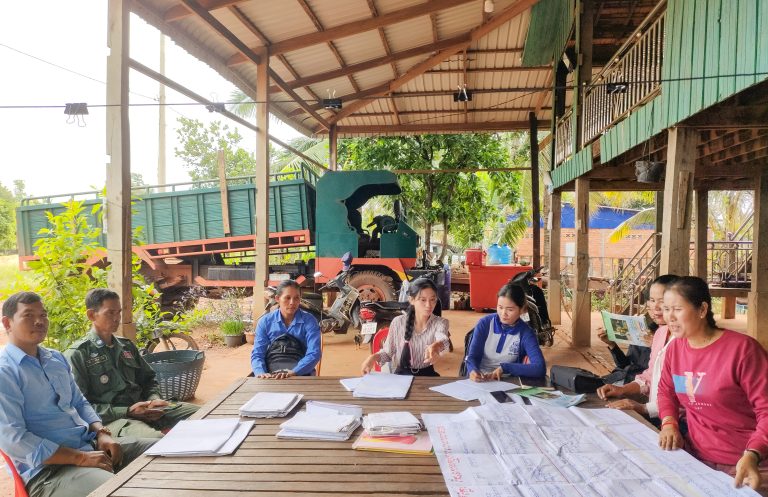
From Farmer to Community Leader: Lai Eang’s Journey of Change
I am grateful to ADRA and the TOGETHER project for investing in my growth. The skills I have gained will not only help me serve my community better but also inspire others—especially women—to take part in building a safer, healthier, and more equal future.
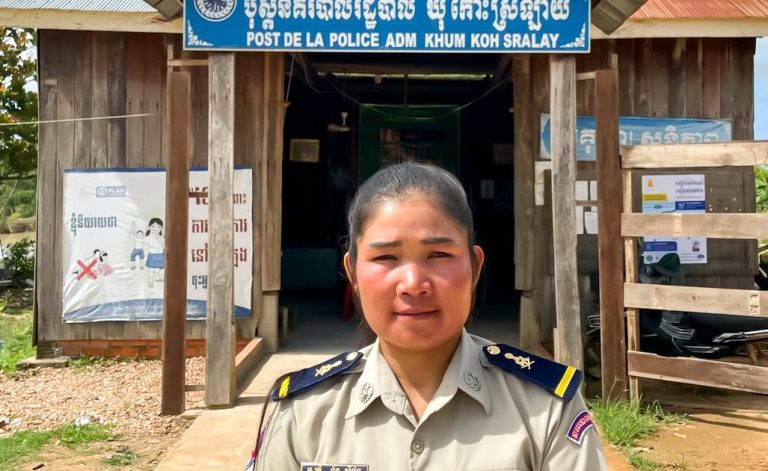
A Voice for Change: Simom’s Role in Building a Safer Community
For Simom, joining the Community Management Committee (CMC) is more than a responsibility—it’s an opportunity to be part of something meaningful. As a police officer and a community member, she is proud to work alongside others who care deeply about creating positive change.
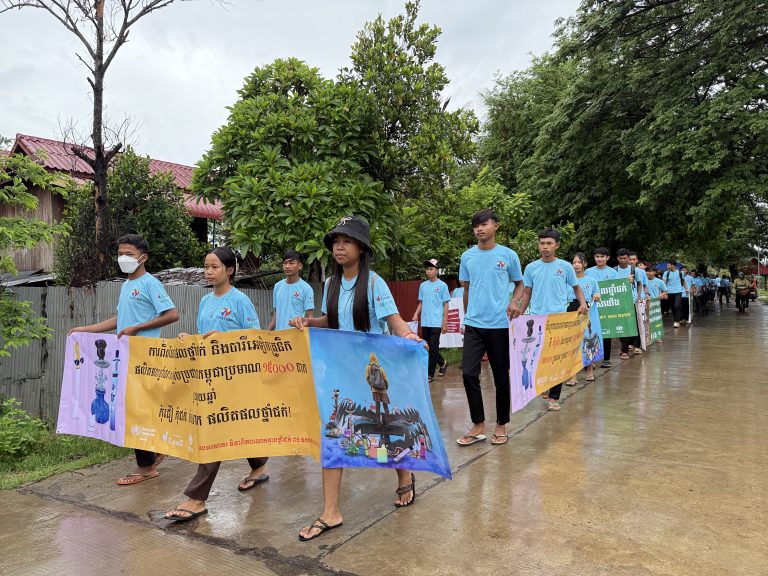
World No Tobacco Day 2025: Unmasking Industry Tactics in Stung Treng Province
Stung Treng, Cambodia – On May 30, 2025, ADRA Cambodia’s TOGETHER project, in partnership with the Stung Treng Provincial Health Department and local authorities, hosted a vibrant community event in Thalabarivat District to commemorate World No Tobacco Day, observed globally on May 31.
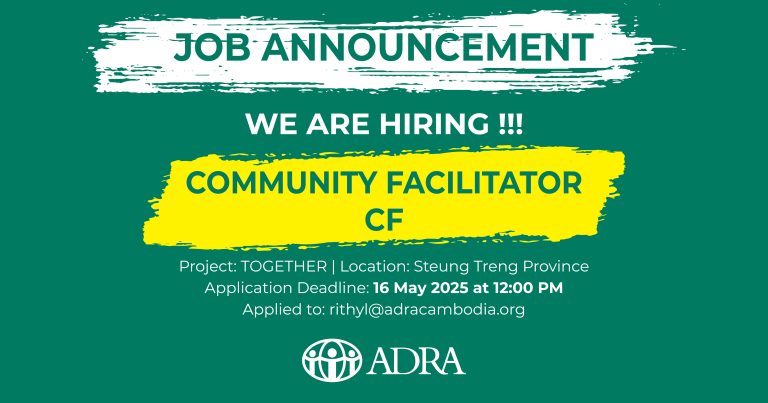
Job Announcement: Community Facilitator CF – 2025
The Adventist Development and Relief Agency (ADRA) Cambodia is looking for a Cambodian national(s) qualified applicant to the position Community Facilitator CF based in Steung Treng province with the Uniting Towards Gender Equality for enjoyment of women’s and girls’ Total Health and Rights (TOGETHER) project.
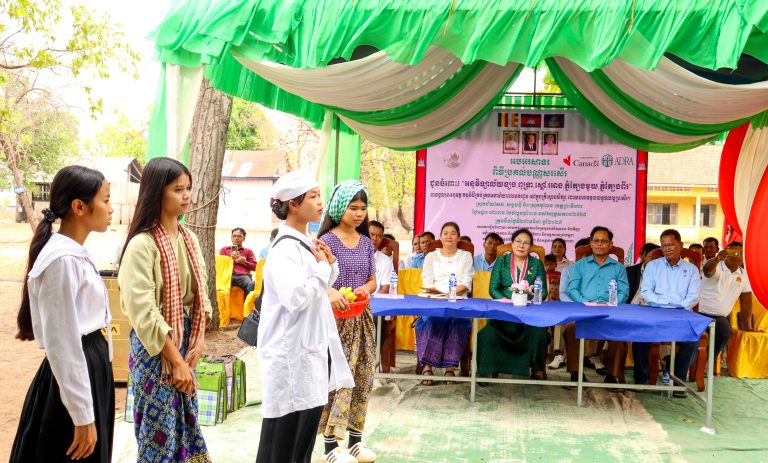
Cambodian Schools Recognized as Model Institutions for Menstrual Hygiene Management
PREAH VIHEAR & STUNG TRENG, Cambodia – March 25-26, 2025 – ADRA Cambodia, in collaboration with the School Health Department of the Ministry of Education, Youth and Sport (MoEYS), the Provincial and District Education Departments, and local authorities, successfully hosted two recognition events to honor nine middle schools for successfully implementing Menstrual Hygiene Management (MHM) practices.
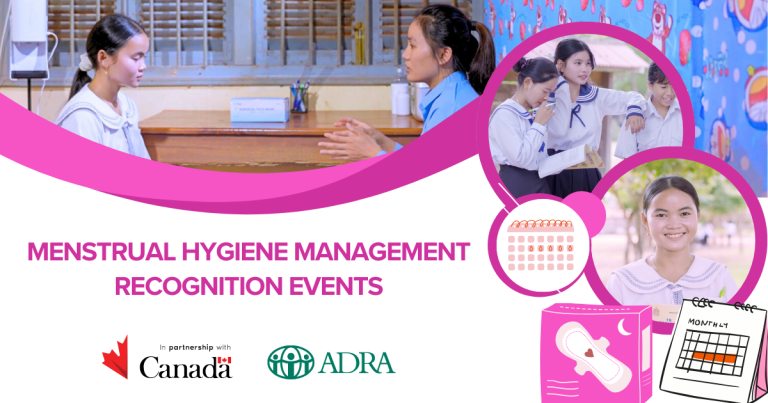
ADRA Cambodia Recognizes Model Schools for Menstrual Hygiene Management
PREAH VIHEAR & STUNG TRENG, Cambodia – March 25-26, 2025 – ADRA Cambodia, in collaboration with the School Health Department of the Ministry of Education, Youth and Sport (MoEYS), the Provincial and District Education Departments, and local authorities, is hosting two recognition events to highlight schools that have successfully implemented menstrual hygiene management (MHM) initiatives. These events will also raise awareness of health, menstrual hygiene, and environmental sustainability.

